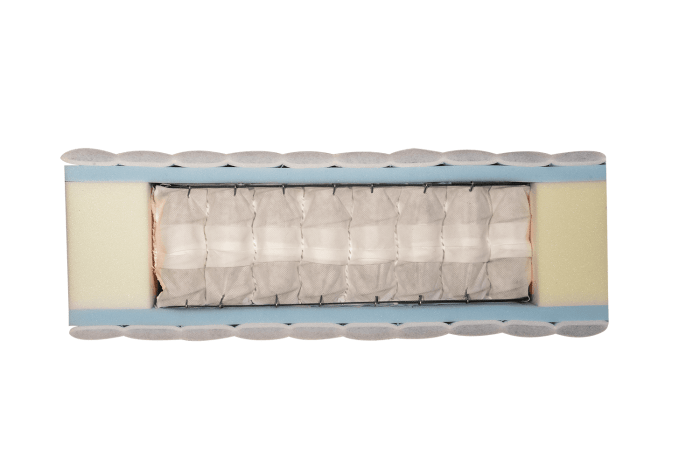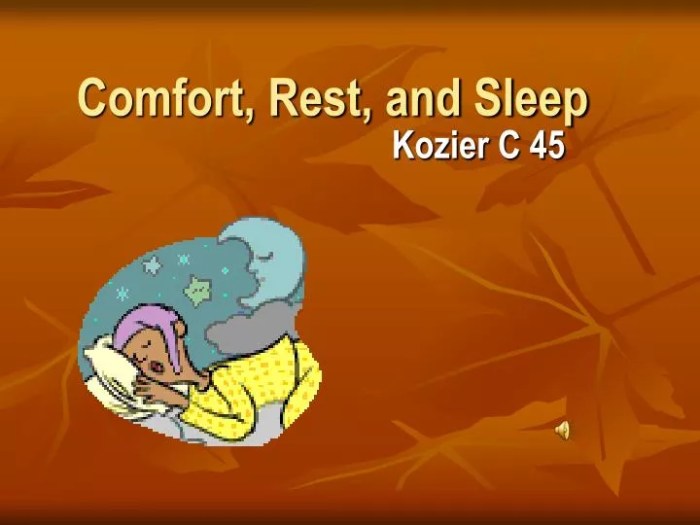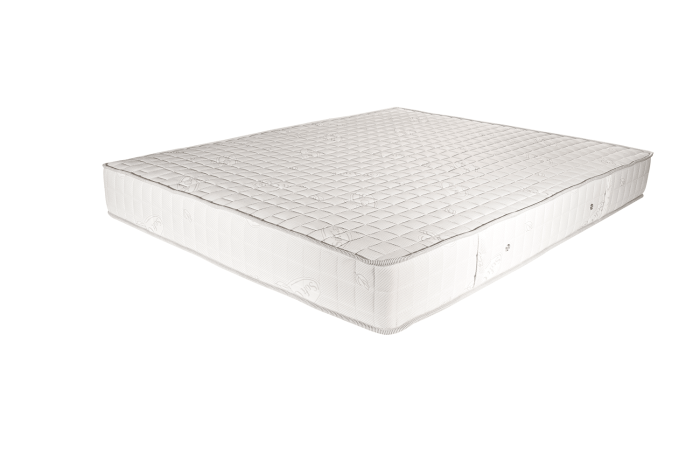Comfort rest and sleep ati – Welcome to the realm of comfort, rest, and sleep, where Ati plays a crucial role. This guide delves into the intricate relationship between these elements, exploring their profound impact on our well-being. Join us as we uncover the secrets to restful nights and discover how Ati can enhance your sleep experience.
Comfort and rest are essential pillars of overall health, providing a sanctuary for both body and mind. When we prioritize comfort and rest, we create a foundation for optimal physical and mental well-being. On the other hand, lack of comfort and rest can take a significant toll on our health, leading to a myriad of issues.
Comfort and Rest

Comfort and rest are essential for our overall well-being. They allow our bodies and minds to recharge and rejuvenate, which is crucial for maintaining good physical and mental health.
There are many activities that can promote comfort and rest, such as:
- Getting enough sleep
- Taking breaks throughout the day
- Exercising regularly
- Spending time in nature
- Doing things you enjoy
When we don’t get enough comfort and rest, it can have a negative impact on our physical and mental health. We may experience fatigue, irritability, difficulty concentrating, and weakened immune systems. In severe cases, lack of rest can even lead to serious health problems, such as heart disease, obesity, and diabetes.
Sleep and Ati: Comfort Rest And Sleep Ati
Ati, also known as Ativan, is a benzodiazepine medication commonly used to treat anxiety disorders. It is also occasionally used as a sleep aid. Ati works by binding to specific receptors in the brain, which increases the activity of a neurotransmitter called gamma-aminobutyric acid (GABA).
GABA has calming effects, which can promote sleepiness and reduce anxiety.
Effects of Ati on Sleep Quality and Duration
Ati can effectively improve sleep quality and duration in individuals with insomnia or other sleep disturbances. It can reduce the time it takes to fall asleep, improve sleep maintenance, and increase the overall quality of sleep. However, it’s important to note that the effects of Ati on sleep may vary depending on the individual and the dosage used.
Potential Side Effects and Precautions
While Ati can be effective in promoting sleep, it is important to be aware of potential side effects and precautions associated with its use:
- Drowsiness:Ati can cause drowsiness, especially during the day or when combined with other sedatives.
- Impaired coordination:Ati may impair coordination and balance, increasing the risk of falls.
- Cognitive impairment:Ati can affect cognitive function, including memory and attention.
- Dependence:Long-term use of Ati can lead to physical and psychological dependence.
Therefore, it is crucial to use Ati as prescribed by a healthcare professional and to follow all recommended precautions.
Restful Sleep Environment

Creating a restful sleep environment is crucial for achieving quality sleep. A conducive sleep space promotes relaxation, minimizes distractions, and supports the body’s natural sleep-wake cycle.
Several factors contribute to an ideal sleep environment, including noise, light, temperature, and the overall ambiance of the bedroom.
Noise
Excessive noise can disrupt sleep by interfering with the body’s ability to enter and maintain deep sleep stages. Minimizing noise levels is essential for restful sleep. Consider using earplugs, white noise machines, or blackout curtains to block out external sounds.
It’s essential to prioritize comfort rest and quality sleep for optimal well-being. When seeking professional chiropractic care, consider Chiro One Town and Country . Their skilled chiropractors can help alleviate discomfort and restore your body’s natural alignment, promoting comfort rest and restful sleep.
Light
Darkness promotes the production of melatonin, a hormone that regulates sleep. Exposure to bright light before bed can suppress melatonin production and make it harder to fall asleep. Create a dark sleep environment by using blackout curtains, eye masks, or dimming lights in the hours leading up to sleep.
Temperature
The ideal sleep temperature is between 60-67°F (15.6-19.4°C). A room that is too warm or too cold can disrupt sleep and make it difficult to fall or stay asleep.
Relaxation Techniques for Sleep

Incorporating relaxation techniques into your sleep routine can significantly enhance the quality and duration of your sleep. These techniques help calm your mind and body, promoting a peaceful and restful state that facilitates deep and restorative sleep.
Various relaxation methods have proven effective in promoting restful sleep. Let’s explore some of the most popular techniques:
Deep Breathing Exercises
- Deep breathing exercises involve taking slow, deep breaths that engage your diaphragm. This technique helps regulate your breathing and heart rate, reducing stress and promoting relaxation.
- Lie down in a comfortable position, close your eyes, and place one hand on your chest and the other on your stomach.
- Inhale slowly and deeply through your nose, filling your lungs with air. You should feel your stomach expand.
- Exhale slowly through your mouth, feeling your stomach contract.
- Repeat this process for 5-10 minutes, focusing on your breath and letting go of any tension.
Meditation
- Meditation involves focusing your attention on a specific object, thought, or activity to calm your mind and promote relaxation.
- Find a quiet and comfortable place to sit or lie down.
- Close your eyes and focus on your breath. Notice the rise and fall of your chest and abdomen.
- If your mind wanders, gently bring it back to your breath.
- Start with a few minutes of meditation and gradually increase the duration as you become more comfortable.
Yoga
- Yoga combines physical postures, breathing exercises, and meditation to promote relaxation and reduce stress.
- Certain yoga poses, such as child’s pose, corpse pose, and forward fold, can help calm the nervous system and promote sleep.
- Consider practicing yoga before bed or as part of your evening relaxation routine.
Incorporating relaxation techniques into your sleep routine can significantly improve your sleep quality. By calming your mind and body, these techniques create a conducive environment for restful and restorative sleep.
Sleep Hygiene Practices
Maintaining good sleep hygiene practices is essential for improving the quality of your sleep. These practices help regulate your body’s natural sleep-wake cycle, promote relaxation, and create an optimal environment for restful sleep.
Recommended sleep hygiene habits include:
- Establishing a regular sleep-wake cycle, even on weekends.
- Avoiding caffeine and alcohol before bed.
- Creating a relaxing bedtime routine, such as taking a warm bath or reading a book.
- Making sure your bedroom is dark, quiet, and cool.
- Getting regular exercise, but not too close to bedtime.
- Avoiding large meals or sugary snacks before bed.
Poor sleep hygiene can lead to insomnia, daytime sleepiness, and other sleep disorders. It can also contribute to health problems such as obesity, heart disease, and diabetes.
Alternative Therapies for Sleep

Alternative therapies offer complementary approaches to support restful sleep. They aim to promote relaxation, reduce stress, and improve sleep quality.
However, it’s crucial to consult with a healthcare professional before using any alternative therapies for sleep. This is to ensure they are appropriate for your individual needs and do not interfere with any medications or medical conditions.
Acupuncture
Acupuncture involves the insertion of thin needles into specific points on the body. It is believed to stimulate the release of endorphins, which have pain-relieving and calming effects. Some studies suggest that acupuncture may improve sleep quality and reduce insomnia symptoms.
Herbal Remedies, Comfort rest and sleep ati
Certain herbs, such as valerian root, chamomile, and lavender, have traditionally been used to promote relaxation and sleep. However, it’s important to note that herbal remedies may interact with medications and have potential side effects. Always consult with a qualified herbalist or healthcare professional before using herbal remedies.
Massage
Massage can help reduce muscle tension, promote relaxation, and improve sleep quality. Massage techniques such as Swedish massage, deep tissue massage, and reflexology may be particularly beneficial for sleep.
Detailed FAQs
What are the benefits of relaxation techniques for sleep?
Relaxation techniques, such as deep breathing, meditation, and yoga, promote restful sleep by reducing stress, calming the mind, and preparing the body for sleep.
How does Ati affect sleep quality?
Ati is a medication that can improve sleep quality and duration by regulating sleep-wake cycles and reducing the time it takes to fall asleep.
What are the potential side effects of Ati use for sleep?
Ati can cause side effects such as drowsiness, dizziness, and nausea. It is important to consult with a healthcare professional before using Ati for sleep to discuss potential risks and benefits.